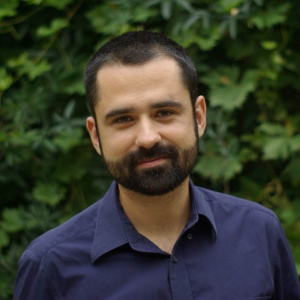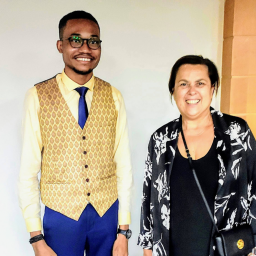Meaningful Business (MB): Can you tell us a bit about the issues you are trying to solve and why you selected them
Emeka Nwachinemere (EN): In 2014, I had a unique opportunity to cultivate and access a five-hectare maize farm for one year without the burden of ownership or rent. It turned out to be one of the longest years of my life due to the challenges I faced, namely relying on guesswork to make my operational decisions. While it wasn’t really a surprise that my harvest was poor, what was shocking were the very low prices offered by middlemen to buy my harvest. I discovered that what was then a one-off occurrence for me, was a lived reality for Nigeria’s 64 million smallholder farmers.
Smallholder farmers who typically manage two-four hectare farms have low yields compared to global averages. Post-harvest, 40% of produce is lost due to poor storage and lack of access to markets. This impacts farm-level productivity and farmer incomes.
These problems arise because smallholder farmers rely on guesswork, instinct and traditional knowledge to make operational decisions, thereby planting at the wrong time, using the wrong inputs (i.e. seedlings, fertiliser and herbicides) and applying these at the wrong time. This generates a vicious and self-perpetuating cycle, as their limited incomes lower their purchasing power, making it impossible for them to afford high-quality inputs, or access to effective storage solutions.

Emeka Nwachinemere, CEO, Kitovu Technology Company
MB: How is your work tackling those problems and what impact are you having?
EN: Kitovu Technology Company provides African smallholder farmers with the data to make smart decisions about what to grow based on market conditions and how to grow them optimally. This enables them to make more money from their farms through yield improvement and reduced post-harvest losses. We have developed several innovative products at the intersection of agriculture, supply chain and finance, transforming African agriculture.
Our product, business model and operational model were designed taking into consideration the poor purchasing power and illiteracy of smallholder farmers. This led us to develop our current ‘Buy Now, Pay Later’ revenue model with service delivery led by a network of trained commission-based agents.
Firstly, our product YieldMax enables smallholder farmers to apply the right quantities of the right fertilisers for their farms, cutting down input costs by 30%. In addition, the combination of certified seeds and Kitovu’s plant health analysis helps increase crop yields.
Secondly, StorageX enables smallholder farmers to turn their farm produce into collateral with which they can borrow funds to meet pressing financial obligations, while simultaneously storing their goods in efficient storage facilities with no upfront payment required. As a result, they are able to delay selling their farm produce until the best prices appear, enabling them to earn up to 40% more from the same quantity of produce.
Finally, eProcure provides smallholder farmers with access to higher-value markets which enables them to earn more from their farm produce than they would earn selling to middlemen.
As a result of our interventions, we have enabled over 16,000 smallholder farmers to increase their crop yields by 30%, cut down input costs and post-harvest losses by 20% and increased their annual incomes by 40%. We have also helped reduce over 180,000 tons CO2e through the regenerative agriculture practices we provide for our farmers.
MB: What support do you need in order to scale your business and increase your positive impact?
EN: We require funds to finance and scale our “Buy Now, Pay Later” model, with about $605 needed per farmer in a typical crop cycle. We are also looking for strategic partnerships with financial institutions, insurance companies and large-scale processors. This would enable us to expand access to credit for smallholder farmers and increase access to markets, storage and quality inputs.
MB: How do you work with partners and the wider ecosystem to achieve your mission?
EN: We are a big believer in partnerships, whether it is with governments or the private sector. We have partnered with Gombe and Niger state governments to provide access to storage, post-harvest management infrastructure and financing to smallholder farmers in the grain value chain. We have also partnered with AFEX Commodities Exchange to extend access to markets for the farmers we support. We are presently looking to identify and partner with more players in the ecosystem, like banks, insurance companies and large-scale processors so as to continue to unlock outsized value for smallholder farmers across Africa.
MB: What is your ambition for the future of your business?
EN: Nearly 800 million people go hungry every day around the world, more than 2 billion lack the nutrients required for a healthy life and one-third of the global population is expected to be overweight or obese by 2030, according to the Global Panel on Agriculture and Food Systems for Nutrition. Rapid population growth, increasing urbanisation and an expanding global middle class will have profound impacts on food and nutrition security and will place intense additional pressure on the environment. The agriculture industry – as one of the biggest sources of greenhouse gas emissions and a sector particularly vulnerable to the impacts of climate change – is in need of a significant revamp.
We want to help build a resilient food system for African agriculture that enables smallholder farmers to become financially sustainable by helping them increase their productivity. Success for Kitovu would be to enable five million smallholder farmers across Africa to increase crop yields by 50%, reduce input costs by 30% and achieve 100% sales of their farm-produce. We want to transform African agriculture one smallholder farmer at a time, positioning Africa as the food hub that would help feed 9.7 billion people by 2050.
MB: How do you measure success?
EN: Kitovu has developed some internal metrics that we use to measure the impact of our work. To effectively measure impact, we usually carry out baseline assessments before the rollout of our services in any location. We then collect data on the adopted metrics as a way to measure impact. Our adopted metrics are as follows:
1. Percentage increase in average crop yield.
2. Average amount of farm-produce sold annually.
3. Percentage decrease in average post-harvest losses.
4. Percentage increase in farmers’ daily living incomes.
5. Percentage increase in good agriculture practice knowledge of farmers.
________
Quickfire questions
MB: Tell us a mistake you’ve learned from
EN: One mistake I have learned from, at great cost, is that of trusting without verifications. My credo now is, “trust, but verify”.
MB: How do you spend your time away from work?
EN: Away from work, I spend time playing with my kids, reading and playing computer games. I also watch a good movie from time to time.
MB: What’s the best piece of advice you’ve ever received?
EN: “Never have any toes anyone can step on”.
MB: What is something you wish you were better at?
EN: Writing Software.
MB: What is the one book everyone should read?
EN: Tribes: We need You, by Seth Godin
________
Discover the other leaders recognised on the 2022 MB100, for their work combining profit and purpose to help achieve the United Nations Global Goals, here.




















